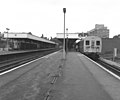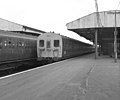British Rail Class 405: Difference between revisions
| Line 21: | Line 21: | ||
==Formations== |
==Formations== |
||
The history of these units is very complex. Many of the |
The history of these units is very complex. Many of the 3-SUB units were rebuilt from former locomotive-hauled stock or the AC electric units built by the [[London, Brighton and South Coast Railway]]. They were then further converted to 4Sub units during the 1940s (the last 3Sub formation ran in 1949) by the addition of a new 'Augmentation' trailer car and renumbered. |
||
The 3-SUB units had operated as 8-car formations during peak periods from the 1920s until 1949 by inserting two-coach trailer sets, formed of converted old steam-hauled vehicles fitted with multiple unit jumper cables, in between two of the 3-car units. This inconvenient approach for marshalling the sets (the trailer sets had no driving cabs) was finally changed to using two 4-car units, not by the straightforward approach of inserting the trailer cars inside the 3-car sets, but by building new steel trailers, which themselves were of completely different and more modern appearence. |
|||
The table below illustrates the basic details of units within the broad number ranges used: |
|||
{{Clear}} |
{{Clear}} |
||
{| class="wikitable" |
{| class="wikitable" |
||
Revision as of 08:14, 30 October 2011
| British Rail Class 405 | |
|---|---|
 4Sub Motor Car at National Railway Museum in York | |
| In service | 1914-1983 |
| Manufacturer | SR Eastleigh |
| Number built | Unknown |
| Formation | power car + 2 trailer cars + power car |
| Operators | Southern Railway and British Railways |
| Specifications | |
| Maximum speed | 75 mph 121 km/h |
| Weight | DMBS - 39–43 long tons (40–44 t) |
| Prime mover(s) | Early units: 4 x 275 hp (205 kW) traction motors total 1,100 hp (820 kW) Later units: 4 x 250 hp (190 kW) traction motors total 1,000 hp (750 kW) |
| Braking system(s) | Air (Westinghouse) |
The Southern Railway (SR) gave the designation Sub to the wide variety of electric multiple units that were used on inner-suburban workings in the South London area. Originally these units were formed as three-car units, but in the 1940s, all surviving units were increased to four cars by the addition of an 'Augmentation' trailer. New four-car units were also built at this time, and these survived in passenger use until late 1983, by which time British Rail had allocated to them TOPS Class 405.
Formations
The history of these units is very complex. Many of the 3-SUB units were rebuilt from former locomotive-hauled stock or the AC electric units built by the London, Brighton and South Coast Railway. They were then further converted to 4Sub units during the 1940s (the last 3Sub formation ran in 1949) by the addition of a new 'Augmentation' trailer car and renumbered.
The 3-SUB units had operated as 8-car formations during peak periods from the 1920s until 1949 by inserting two-coach trailer sets, formed of converted old steam-hauled vehicles fitted with multiple unit jumper cables, in between two of the 3-car units. This inconvenient approach for marshalling the sets (the trailer sets had no driving cabs) was finally changed to using two 4-car units, not by the straightforward approach of inserting the trailer cars inside the 3-car sets, but by building new steel trailers, which themselves were of completely different and more modern appearence.
The table below illustrates the basic details of units within the broad number ranges used:
| Unit Numbers | Type | Introduced | Formation | Notes |
|---|---|---|---|---|
| 989-1200 | - | 1920–1937 | Various | Two-car Sub Trailer sets. Converted from LSWR, SECR and LBSCR steam stock and LBSCR AC electric stock. Disbanded between 1941–1948, some cars used to augment 3Sub to 4Sub. |
| 1201–1284 | 3Sub | 1914–1917 | DMBT+TC+DMBC | Built by London and South Western Railway, their numbers E1-E84, ex-steam stock. Most augmented to 4131-4171 and 4195-4234 series in 1942-1948. |
| 1285–1310 | 3Sub | 1925 | DMBT+TC+DMBT | Western Section (London to Guildford & Dorking) units, new-build, short frames. Augmented to 4300-4325 series in 1945-1946. |
| 1401–1495 | 3Sub | 1925–1926 | DMBT+TC+DMBT | Eastern Section units, ex-SECR steam stock. Most augmented to 4431-4594 series in 1946-1949. |
| 1496–1524 | 3Sub | 1925 | DMBT+TC+DMBT | Eastern Section units, new-build, standard frames. Augmented to 4326-4354 series in 1945-1946. |
| 1525–1534 | 3Sub | 1926 | DMBT+TC+DMBT | Eastern Section units, ex-SECR steam stock. Most augmented to 4431-4594 series in 1946-1949. |
| 1579–1599 | 3Sub | 1932–1937 | DMBT+TC+DMBT | Ex-LSWR steam stock. Most augmented to 4401-4594 series. |
| 1601–1630 | 3Sub | 1927–1928 | DMBT+TC+DMBT | Central Section units, ex-SECR steam stock. Most augmented to 4431-4516 series. |
| 1631–1657 | 3Sub | 1928–1929 | DMBT+TC+DMBT | Central Section units, ex-LBSCR steam stock. Most augmented to 4517-4614 series. |
| 1658–1701 | 3Sub | 1927–1928 | DMBT+TC+DMBC | Central Section units, ex-LSWR steam stock. Most augmented to 4172-4194 and 4235-4250 series. |
| 1702–1716 | 3Sub | 1928 | DMBT+TC+DMBC | Central Section units, ex-LBSCR steam stock. Most augmented to 4517-4614 series. |
| 1717–1772 | 3Sub | 1929–1930 | DMBT+TC+DMBC | Central Section units, ex-LBSCR AC electric stock. Most augmented to 4517-4579 series. |
| 1773–1785 | 3Sub | 1930–1931 | DMBT+TC+DMBC | Ex-LSWR steam stock. Most augmented to 4517-4614 series. |
| 1786–1796 | 3Sub | 1931–1932 | DMBT+TC+DMBT | Ex-LSWR steam stock. Most augmented to 4517-4614 series. |
| 1797–1801 | 3Sub | 1932 | DMBT+TC+DMBT | Ex-LBSCR steam stock. 1801 later renumbered 1600. Some augmented to 4580-4614 series. |
| 4101 | 4Sub | 1941 | DMBT+TT+TC+DMBT | Prototype new-build, steel bodied 4Sub unit with domed cab roof. |
| 4102-4110 | 4Sub | 1944–1945 | DMBT+TT+TT+DMBT | New-build, steel bodied 4Sub units with domed cab roof. |
| 4111-4120 | 4Sub | 1946 | DMBT+TT+TT+DMBT | New-build, steel bodied 4Sub units with vertical cab roof. |
| 4121-4130 | 4Sub | 1946 | DMBTo+TTo+TT+DMBTo | New-build, steel bodied 4Sub units with vertical cab roof. |
| 4131-4171 | 4Sub | 1942–1948 | DMBT+TT+TT+DMBT | Ex-3Sub units, with additional ex-3Sub trailer car. |
| 4131-4132 | 4Sub | 1969 | DMBT+TT+TT+DMBT | Second use of unit numbers. Formed from spare steel-bodied Sub cars, including those used in the 7TC unit. |
| 4172-4194 | 4Sub | 1947–1948 | DMBT+TT+TT+DMBT | Ex-3Sub units, with steel-bodied Augmentation trailer. |
| 4195-4234 | 4Sub | 1942–1948 | DMBT+TT+TT+DMBT | Ex-3Sub units, with additional ex-3Sub trailer car. |
| 4235-4249 | 4Sub | 1947–1949 | DMBT+TT+TT+DMBT | Ex-3Sub units, with steel-bodied Augmentation trailer. |
| 4250-4257 | 4Sub | 1942–1948 | DMBT+TT+TT+DMBT | Formed from a variety of spare Sub cars. |
| 4277-4299 | 4Sub | 1948–1949 | DMBTO+TTO+TT+DMBTO | New build, steel-bodied 4Sub units. |
| 4300-4354 | 4Sub | 1945–1946 | DMBT+TT+TT+DMBT | Ex-3Sub units, with steel-bodied Augementation trailer. |
| 4355-4376 | 4Sub | 1947–1948 | DMBT-TT-TT-DMBT | New build, steel-bodied 4Sub units. |
| 4377 | 4Sub | 1947 | DMBT-TTO-TT-DMBT | New build, steel-bodied 4Sub unit, including prototype full saloon trailer car. |
| 4378-4387 | 4Sub | 1948 | DMBTO+TTO+TT+DMBTO | New build, steel-bodied 4Sub units. |
| 4401-4594 | 4Sub | 1946–1947 | DMBT+TT+TT+DMBT | Ex-3Sub units, with steel-bodied Augmentation trailer. |
| 4601-4608, 4610/13/14 | 4Sub | 1947 | DMBT+TT+TT+DMBT | First use of unit numbers. Ex-3Sub units, with steel-bodied Augmentation trailer. |
| 4601-4607 | 4Sub | 1950 | DMBTO+TT+TT+DMBTO | Second use of unit numbers. New Driving Motor cars formed with trailers built between 1946-48. |
| 4617-4620 | 4Sub | 1972–1976 | Formed from spare Sub cars built between 1946-1950. | |
| 4621-4754 | 4Sub | 1949–1951 | DMBTO+TT+TT+DMBTO | Most cars had new bodies on old frames, though some were entirely new build. 4667-4754 included an Augmentation trailer from withdrawn units. |
Preservation
A handful of Sub stock carriages have survived in preservation, thus:
- Driving Motor car number 8143 (formerly of Sub unit 1293, later 4Sub 4308) is in the care of the National Railway Museum, York.
- 4Sub unit number 4732, formed of DMBTO 12795, TT 10239, TTO 12354 and DMBTO 12796, was retained by British Rail after withdrawal from normal passenger service for use on special occasions. It is currently Stored at the Electric Railway Museum, Baginton, after spending many years stored in the open at various locations.
-
Unit 4692 at Beckenham Junction 1979
-
Unit 4617 at Epsom 1979
-
Unit 4729 at Epsom 1979



